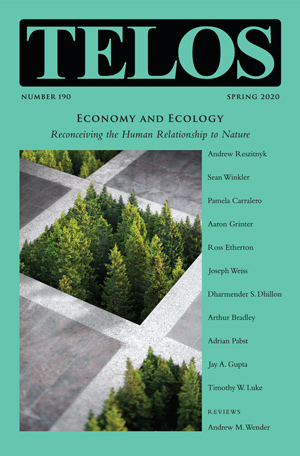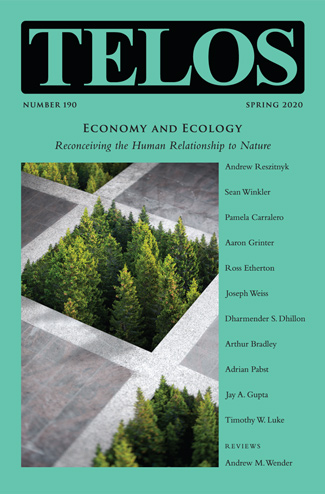Sean Winkler’s “Practice and Ideology in Boris Hessen’s ‘The Social and Economic Roots of Newton’s Principia’” appears in Telos 190 (Spring 2020): Economy and Ecology: Reconceiving the Human Relationship to Nature. Read the full article at the Telos Online website, or purchase a print copy of the issue in our online store. Individual subscriptions to Telos are available in both print and online formats.
 In this paper, I examine the meaning of and relationship between “practice” and “ideology” in Boris Hessen’s “The Social and Economic Roots of Newton’s Principia.” I propose that for Hessen, practice can be defined as the transformation of things-in-themselves into things-for-us, as well as the transformation of things-in-themselves into things-for-themselves. Ideology, for Hessen, refers to the specific difference between practice and theory, when the practical roots of theory are concealed. In section 1, I explain the Hessen theses and identify means and relations of production as the two kinds of practice presented in the Newton paper. In section 2, I trace the history of the composition and reception of the Hessen theses, showing that any attempt to understand practice and ideology in Hessen’s work requires incorporating his not only Marxist but Deborinite background. In section 3, I explain conceptions of practice and ideology from previous Marxist thinkers and how Hessen, as a Deborinite, may have integrated aspects of these conceptions into his own view. In section 4, I show that Nikolai Bukharin’s “Theory and Practice from the Standpoint of Dialectical Materialism” provides the proper complement for understanding the remaining elements of Hessen’s account.
In this paper, I examine the meaning of and relationship between “practice” and “ideology” in Boris Hessen’s “The Social and Economic Roots of Newton’s Principia.” I propose that for Hessen, practice can be defined as the transformation of things-in-themselves into things-for-us, as well as the transformation of things-in-themselves into things-for-themselves. Ideology, for Hessen, refers to the specific difference between practice and theory, when the practical roots of theory are concealed. In section 1, I explain the Hessen theses and identify means and relations of production as the two kinds of practice presented in the Newton paper. In section 2, I trace the history of the composition and reception of the Hessen theses, showing that any attempt to understand practice and ideology in Hessen’s work requires incorporating his not only Marxist but Deborinite background. In section 3, I explain conceptions of practice and ideology from previous Marxist thinkers and how Hessen, as a Deborinite, may have integrated aspects of these conceptions into his own view. In section 4, I show that Nikolai Bukharin’s “Theory and Practice from the Standpoint of Dialectical Materialism” provides the proper complement for understanding the remaining elements of Hessen’s account.








